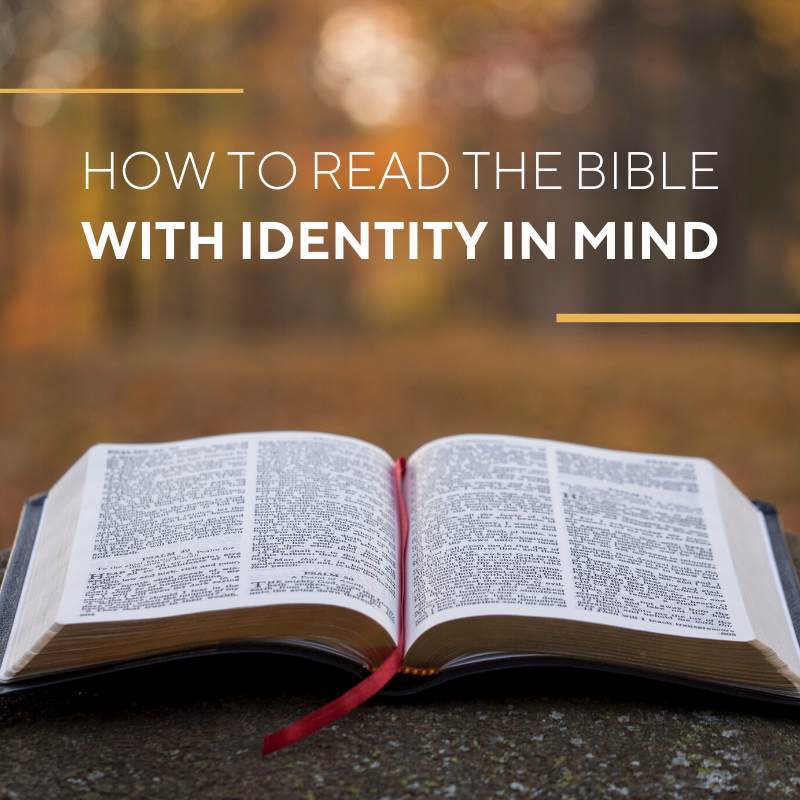How to Read the Bible with Identity in Mind
by: Dustin Crowe
After rising earlier in the morning than we want, identity questions invade our mind as we look in the mirror, think about the upcoming day, and decide what to wear. Do I want my clothes to be the casual me, the dressed-up me, the outdoorsy me, the stylish me, or the “life beat me down so I didn’t care” me? We don’t realize we’re thinking in terms of identity, but the questions of “Who am I? Who do I want to be? How do others view me?” shape us all day long.
This means we need to get ahead of this daily fight, and we do so by choosing to root our identity in Christ so He directs our day. If we don’t intentionally and firmly plant our feet there, we’ll be swept up in the strong currents of other identities taking us in other directions. In this post, I want to encourage us to read the Bible with identity in mind.
That encouragement needs an accompanying caution. The caution is to not read the Bible solely or primarily with yourself in mind. It’s first and foremost about God’s glory and His gracious plan to make Himself known in the world and to redeem a lost people to Himself. (Jen Wilkin wrote an excellent piece on dwelling on God with awe more than focusing on identity.)
The two should not be sharply separated, since we are made in God’s image and called to reflect Christ. What I want to lay out is a way to read the Bible in mind that begins with a right understanding of Jesus that flows into a right understanding of self. How do we root ourselves in him and walk in him so the fullness of who he is bears fruit in our life (Col. 2:6-9)?
Since my identity is found in Christ, and sanctification is the process of the Spirit remolding me into his image (Col. 3:10), we can read the Bible with a focus on who Jesus is (worship) and then think about what’s true of me because I’m in Him (identity). Because identity should be expressed, I then apply it to my thoughts, affections, and actions (ethics). This keeps my sanctification grounded in a longing to see and become like Jesus as well as an awareness of what’s true about me (indicative) and available for me now that I’m in Christ.
In other words, I read with my eyes open to the model of “Jesus is,” “In Jesus I am,” and “therefore I will.” Here’s an example from what I most recently read, Galatians 4:4-5.
Jesus is my righteous redeemer who frees me to be a grateful son.
“But when the fullness of time had come, God sent forth his Son [Jesus], born of woman, born under the law, to redeem those who were under the law, so that we might receive adoption as sons.” Galatians 4:4-5 (ESV)
Jesus is…born of woman, born under the law, to redeem those who were under the law.
Jesus entered this big blue earth just like every other person, through the very human and humbling act of childbirth. Our messy lives lack sanitization, and Jesus experiences this reality from the moment of his birth in a dirty stable to a mother with no place to go. His body consisted of the same material as anyone else: hands and feet, oily flesh, life-giving blood, and unique physical traits making him identifiable as Jesus of Nazareth. He laughed at a good joke, cried because of pain, felt the emotional drain of weariness, and the joy of intimate friendships.
As part of his human birth, Jesus joined a particular people group in place and time. As an Israelite, he was “born under the law” (Gal. 3:13; 5:3). It required perfect obedience.
God required Adam to obey God’s command and he failed. Israel was to obey God’s law, but they also failed. Jesus as the second Adam and true Israel fulfilled the law perfectly. Every day, by the power of the indwelling Holy Spirit, he said yes to the Father in each and every situation. He never sinned but always obeyed, unlike Adam, Israel, you, and me. Jesus became God in flesh so that as the man who lived a perfectly righteous life he might lay down that same life to redeem mankind from their sins.
In Jesus I am…redeemed from the penalty and crushing weight of the law.
In Jesus I am redeemed from the law. Like a house pulverizing the dirt and sending small cracks into the load-bearing concrete underneath it, the law sits on our shoulders and crushes us with guilt. Most of us will in some moments rightly feel the weight of the law and the heavy tug of guilt because we have not fully and completely obeyed God’s law. We do lots of good things and we’re not as bad as other people (at least we think), but the law demands perfection, not our best effort.
And yet, now that I’m united to Christ, I am free because he perfectly kept the law and died to take that enormous weight off my shoulders and onto his own back. All the law’s demands against me were paid in full as he bore my sins on the bloody tree.
His redemption payment bought me out of my prison of slavery so I am no longer held captive because of the condemnation of the law. Although God used to relate to me according to my sin, He now only sees the righteousness of Christ covering me like a full-bodied coat. My sin is completely removed and the debt is fully satisfied. All that remains for me is Jesus’ righteousness and the full freedom of an adopted son.
“Romans 8:1 tells us that there is no condemnation for us, not because of all the great stuff we’ve done but because Christ has set us free from the law of sin and death. My sin in the past: forgiven. My current struggles: covered. My future failures: paid in full all by the marvelous, infinite, matchless grace in the atoning work of the cross of Jesus Christ.” Matt Chandler[1]
Because in Jesus I am redeemed from the penalty and weight of the law, I will…live in the freedom and joy Christ gives and not enslavement to law.
If we’re thankful when somebody spends twenty bucks on us at Christmas, what kind of gratitude is evoked by the grace of Jesus that fully paid our guilt? The more we reflect on Christ’s perfect life and sacrificial death, including the love for us it demonstrates and the work of salvation and forgiveness it purchases, the more it stirs our hearts to rejoice in him with thankfulness.
Our worship of Jesus centers our identity as his humble, redeemed followers and it produces a heart propelled by the fuel of gratitude. Our motivation isn’t found by going back to the law but by returning to and rehearsing the amazing grace of the gospel.
The temptation to run back to what I’ve always known proves strong, but I won’t go back to trying to rescue myself, bargaining with God with my “good works,” or living under the law’s demands.
If Jesus supplies a perfect righteousness for me, why would I in vain seek to attain my own? If Jesus liberated me from the law’s demand by fulfilling it on my behalf, why would I live today as if I’m doomed? In him I’m righteous, accepted, free from condemnation, and if God sees me that way, I will see myself that way. Seeing things as God sees them instead of how my over-emotional, prone to lies, ridiculously skewed vantage sees them works out better anyways.
I will let Jesus be Jesus and I will be the follower). As much as I’d like to rewrite history and live in a fantasy world where I’m the hero of my story, the reality is Jesus is the heroic redeemer and I’m at best the helpless sinner who gets in the way. Even as a believer in Christ I’m still sinful and stubborn, and because of that my sins pile up like a ton of bricks. If I try to carry them myself I’ll sink under despair from guilt.
I must do today what every person must do when they first believe: look to Jesus as my redeemer and by faith let him be the one who carries me, and the baggage of sin and struggles that come with me.
Walking by faith requires trusting that Jesus atoned for my sin and reconciled me back to God. To act as if I need to self-atone or make up for my sins, or that I’ve blown it when it comes to my relationship with God, suggests I’m living according to works and not faith. Living as a son free from the law’s demands means I can daily take the yoke off my own shoulders and place it on Jesus. I’ll walk in freedom not because I don’t still sin but because Jesus has fully paid for my sin.
Since Jesus is my mediator, I will come to God through him and not according to my own or anyone else’s merit.
Since Jesus is my righteousness, I will trust in and rest in his righteousness alone.
Since Jesus secured my redemption, I will neither live as if I’m still in bondage nor try to rescue myself.
Since Jesus is my mediator, my righteousness, and my redemption, I will walk in the freedom, the joy, and the intimacy of being God’s child who belongs and is loved.
Through Jesus I can have joy in freedom in love instead of fear in bondage.
*This post originally appeared at www.indycrowe.com.
Footnotes[1]Matt Chandler, The Explicit Gospel (Wheaton: Crossway, 2012), 15.





